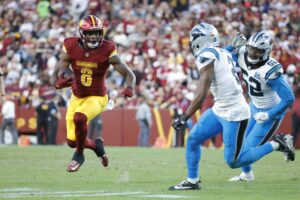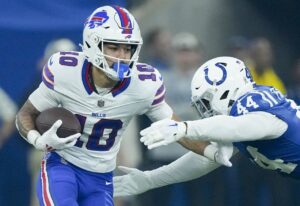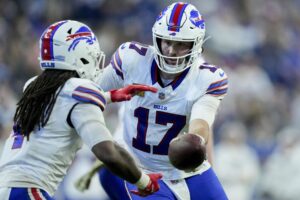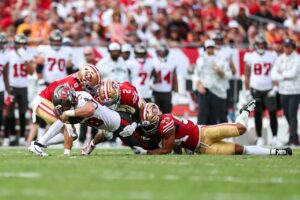The New Orleans Saints had one of its worst offensive performances of the Sean Payton/Drew Brees era in a Week 10 match-up with the Atlanta Falcons. That 26-9 loss was the lowest point total scored at home by New Orleans since the arrival of Payton and Brees in 2006. It was also the first time a Brees-led Saints offense failed to score a touchdown.
While penalties and injuries played a big part in the loss, the Saints lopsided run/pass ratio didn’t help either. New Orleans called 52 pass plays compared to 11 runs against Atlanta, allowing the Falcons defensive front to focus on its pass rush. By the end of the game, Atlanta had logged 11 total hits on Brees, including six sacks.
When they face the Falcons again on Thursday night, the Saints offensive balance needs to lean more towards the run game.
Balance for New Orleans Saints Offense Key to Winning Rematch With Atlanta Falcons
Overview of Saints Rushing Offense in Week 10 Loss
New Orleans didn’t make much of an effort to get their run game going in Week 10. They called six run plays in the first half, four of which were on their first drive. On that possession, New Orleans made it down to the Falcons two yard line before eventually settling for a field goal. The Saints wouldn’t get that close to the Falcons end zone again until the final play of the game.
The Saints weren’t exactly unstoppable on these run plays. However, they still managed a decent 67 percent success rate and averaged 4.0 yards per carry on first half runs per Sharp Football Stats.
New Orleans practically gave up on the run in the second half as they played catch-up. However, this approach didn’t seem necessary considering they trailed by just one score throughout the third quarter. On the four third quarter runs they did attempt, New Orleans averaged 5.5 yards per carry and had a 75 percent success rate.
The Saints finished the game with a 46 percent success rate when passing, compared to 73 percent on the ground. Strategically, New Orleans clearly planned on passing all over the Falcons 23rd ranked pass defense. Atlanta entered the match-up much stronger against the run, with a sixth-ranked 3.9 yards per carry average allowed through their first eight games.
Did Andrus Peat Injury Force Saints to Double Down on Passing Game?
As Atlanta’s pass rush proved to be unusually effective, it’s surprising that New Orleans didn’t eventually start mixing in more run plays. Perhaps coaches worried that back up left guard Will Clapp wouldn’t fare well in run blocking.
Clapp is usually the third string left guard and spends most of his time in the swing-tackle role. Following an injury to starter Andrus Peat, Clapp was thrust into the starting role since primary backup Nick Easton was a healthy inactive in Week 10.
If coaches were in fact worried about Clapp in the run game, they should have also considered how he might handle such a heavy workload of pass-blocking. Clapp gave up two sacks and several pressures in just over two quarters of playing time.
Starting left tackle Terron Armstead is expected to miss Thursday’s contest with an ankle injury and Easton figures to start in Peat’s place for the third straight week. With this context, it makes sense to include a healthy portion of run plays to reduce the number of pass rushes the Saints backups face.
Atlanta’s Weaknesses
While the Falcons are allowing just 3.9 yards per carry overall this season, this figure is somewhat misleading. Since Atlanta has lost eight games this year, many of the run plays called against them were opponents efforts to run out the clock in the second half.
When you narrow down the Falcons run defensive statistics to first half runs , the numbers tell a different story. Atlanta has surrendered a 21st-ranked 48 percent success rate and 4.3 yards per carry on first half runs by running backs. While these are still decent figures, they show that teams can find success on the ground against this defense early in games.
Atlanta is most vulnerable on outside runs by running backs. They’re giving up 4.5 yards per carry and a 54 percent success rate on outside runs to the left, and 7.9 yards per carry and a 71 percent success rate on the right side. On 47 total outside running plays, opposing running backs have 12 gains of 10+ yds (6 on each side).
Following two solid rushing performances in their last two games, running backs Alvin Kamara and Latavius Murray should be able to find room against this defense. With that said, if Saints intend to go with higher percentage of runs this time, they can’t be stubborn with their game plan like last time. If runs aren’t working, they should be flexible and put the game in the hands of Brees.
Play-Action
It was surprising to learn last week that New Orleans has used play action less than any NFL team this season. That trend continued last week, as New Orleans ran just four play action passes in their win over the Carolina Panthers. Those four plays were quite successful, resulting in 12.3 yards per pass attempt.
Generally the Saints have found success on their 51 play action passes this season. They average 9.2 yards per play action pass attempt, well above their 7.2 yards per attempt average on all passes.
The Kansas City Chiefs, who use play action more than any other team average 8.3 yards per play action pass attempt. The Dallas Cowboys use play action the second-most and average 9.7 yards per play action pass attempt. The third highest usage comes from the Los Angeles Rams, who average 8.0 yards per play action pass attempt.
If New Orleans is enjoying similar (or better) success compared to the teams who use play action the most, then why aren’t they calling these plays more often?
Whatever the reason is, Atlanta should provide a good opportunity to mix in more play action passes. After recording just seven sacks in their first eight games, the Falcons had 11 combined sacks in Weeks 10 and 11. Play-action can both slow down pass rushes and force linebackers to play less aggressively. If Atlanta uses their Week 10 defensive strategy again in the rematch, play action could prove to be a valuable tool.
Bottom Line
No matter how the Saints offense decides to attack Atlanta, it won’t matter if the Saints continue getting penalized at such a high rate. New Orleans has been penalized nine or more times in each of their last three games, including 12 infractions and 90 yards lost against Atlanta earlier this month. These penalties often occurred in the worst of times, leading to third and long plays or nullifying successful third down conversions.
Nonetheless, this is still a very beatable Falcons team. New Orleans will likely get the best version of their arch-rival again on Thursday, but they have the elements needed to beat Atlanta, as eight other teams have this year.
As long as the Saints can stay balanced on offense and cut down on penalties, there’s no reason why they can’t come out on top this time around.
Main Photo:
Embed from Getty Images






